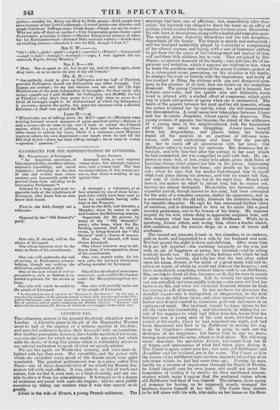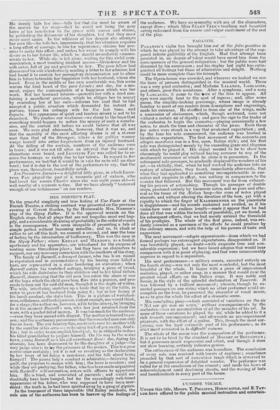LEONTINE FAY.
THIS charming actress is the greatest theatrical attraction now in London. A tolerable place in the pit of the Haymarket Theatre must be had at the expense of a serious squeeze at the door ; and crowded audiences receive their favourite with acclamations. Our brother journalists, however, have hardly mentioned her name, —a circumstance for which we are unable to account, but which adds the desire of doing that justice which is withheld by others to our natural inclination to speak of what we greatly admire. We saw her again on Wednesday evening, and were more de lighted with her than ever. Her versatility, and the power with which she exhibited every mood of the female mind, were quite wonderful. The greatest performance was in a piece called Une Faute—one of those domestic tales of wo which the French dra- matists tell with such effect. It was, indeed, so full of truth and nature, that we feel it, even now, as a kind of reality, and are lin- able to drive it from our remembrance. It betrayed us to a degree of weakness not usual with such old stagers ; and we must justify ourselves by telling our readers what it was that moved us so greatly. Lionie is the wife of Ernest, a young French nobleman,' The marriage had been one of affection ; but, immediately after their union, the husband was obliged to leave his home on an affair of politics, which rendered him an absentee for some years. Meanwhile his wife lives at his chateau, along with a foolish and romantic aunt._ The opening scene discovers Grineheux and his wife Josephine, dependants of the family. The female is moody and melancholy ; and her husband (admirably played by LAPORTE) is complaining of her altered manner, and trying, with a sort of humorous pathos, to get from her the cause of her estrangement and neglect of him- self and their little children, but in vain. They are joined by Bal- thazar, an ancient domestic of the family ; who falls into fits of im- patience and irritation, which it appears are habitual to him when he hears the goodness and virtues of the young Countess spoken of. In a subsequent scene, presuming on his situation in the family, he charges the aunt so bitterly with the imprudence and levity of her conduct in filling the chateau with gay and dissipated coin- panyin the absence of its lord, that she insists on his immediate dismissal. The young Countess appears ; her gait is languid, her features care-worn, and her speech slow and deliberate, every word is uttered with a studied effort at composure, which gives way to a look and gesture of agony when she is unobserved. She hears of the quarrel between her aunt and her old domestic, whom she orders to attend her by-and-by, when she will communicate her determination. A sweet scene now takes place between Leonie and her favourite Josephine, whose secret she discovers. The young woman, it appears, had become the object of the addresses of a young man in the neighbourhood, with the fascination of which her mind was struggling. Leonie raises herself from her despondency, and places before her humble friend all the motives to an exertion of virtuous reso- lution, with such earnestness and force that she prevails on her to break off all intercourse with her lover. Old Balthazar enters to receive his sentence. She dismisses her at- tendant, and tells him that after the outrage to her aunt which he had committed, she was compelled to part with him. He im- plores in vain—but, at last, rising into anger, gives dark hints of knowing things which placed her fate in his power. Repressing the emotions that shake her frame, she insists on his speaking out ; when he says that his master had charged him to report what took place during his absence, and that he would tell him, not only of visits in the day, but in the night also. Struck with horror, she makes an effort to detain him, but he rushes out, leaving her almost distracted. Meanwhile, her husband, whose expected arrival, though known to her aunt, had been concealed for the sake of a romantic surprise, makes his appearance, and in a conversation with the old lady, interests the audience deeply in his amiable character. He says he has renounced further views of ambition, and is determined to live on his estate like a good country gentleman, and in the bosom of his family. He inquires eagerly for his wife, whose delay in appearing surprises him, and then wonders what has become of old Balthazar. While he is speaking, Llonie enters, and, seeing him, utters a fearful shriek,. falls senseless, and the curtain drops on a scene of terror and confusion.
The second act presents Leonie in her chamber, in an undress, pale as death, and supported to a sofa by her husband and aunt. She had passed the night in fever and delirium. After some time thy are left together—she reclining languidly on the sofa, but with an air of happiness at seeing her husband—and he sitting tenderly beside her. He speaks of the feelings with which he had watched by her bedside, and tells her that she had often called upon his name, Ernest, in the midst of a great many wild and in- coherent words, of which be could not discover the meaning ; and then immediately something induces him to wish to see Balthazar. She, unable to stand all this, becomes so ill, that he runs in search of some composing medicine. Left to herself, her agony bursts out uncontrolled, and rises rapidly to frenzy—she cries out that her brain is on fire, and when her wretched husband returns he finds her raving in a fit of insanity. In her madness she discovers the dreadful secret—she is transported, in imagination, to the fatal night when she fell from virtue, and gives unrestrained vent to the horror and despair excited by conscious guilt and dishonour in an undepraved mind. Her husband, turned to stone, listens to her till she sinks into insensibility ; and afterwards, by adding the re- sult of his inquiries to what had fallen from her, learns that her betrayer was a young man of his own name, who had been a visitor at the castle, where he had remained one night, and had been discovered and fired at by Balthazar in making his way from the Countess's chamber. He is going to seek out the destroyer of his happiness ; but learns that he was no more, having since joined the army, where he had fallen. The following scene discovers the miserable Leonie, recovered from her fit of frenzy, and unconscious of what had taken place during it. The Count is again seated near her; her aunt, old Balthazar, and Josephine and her husband, are in the room. The Count, as if in the course of an indifferent conversation, begins to tell a story of an adventure which he had had some time ago. Passing, he says, hastily on a mission of importance through the South of France, he found himself near his own home, and could not resist the temptation of visiting it by stealth: he then mentioned circum- stances which make it appear that the nocturnal visitor whom old Balthazar had fired at was himself. The old man, in an agony of remorse for having, as he supposed, cruelly wronged his troistress, throws himself at her feet. The Count then desires to be left alone with his wife, who sinks on her knees on the floor.
He sternly bids her rise—tells her that she must be aware of the motive for his story—thet he could not bring the gray
hairs of his benefactor to the grave with sorrow and shame, by publishing the dishonour of his daughter, but that they must never meet again. In the wildness of her despair she attempts
her own life—he tells her, impressively, that her situation requires . a long effort of courage, to live for repentance ; obtains her pro- mise to make this effort, and makes her swear to comply with his desire as to her future life, which he should immediately commu-
nicate to her. While she is left alone, waiting for this awful com- munication, a most touching incident occurs—Grincheux and his
wife enter, full of joy and gratitude to her. The poor fellow had discovered his wife clandestinely sending a letter to her admirer, but had found it- to contain her peremptory determination not to allow him in future to trouble her happiness with her husband, whom she
loved. Even in the middle of her own unutterable WO, this scene warms the kind heart of the poor Leonie ; and she, for a mo-
ment, enjoys the contemplation of a happiness which was her work. But her husband returns—presents her with a deed con- taining a munificent provision, which he obliges her to accept by reminding her of her oath—informs her aunt that he had accepted a public situation which demanded his instant de- parture, kisses his unhappy wife for the last time, and departs. Her appearance of quiet and tearless misery is not to be
described. We confess our weakness—we clung to the hope that something would happen to soften the misery of such a conclu- sion, and the curtain fell before we could believe that all was over. We were glad afterwards, however, that it was so, and that the morality of this most affecting drama is of a sterner cast than that of the Stranger, where a far guiltier woman weeps herself into entire forgiveness from an injured husband. At the falling of the curtain, numbers of the audience were in tears ; and it was not till after an interval that the usual ac- clamations were heard, and LEONTINE FAY was called for to re- ceive the homage so richly due to her talents. In regard to her performance, we feel that it would be in vain for us to add another word ; but it is due to the rest of the performers to say, that the piece was, throughout, beautifully acted. Les Premieres Amours—a delightful little piece, in which LEON- TINE FAY played the part of a romantic girl of sixteen, who had loved her cousin Charles since she was eight years old—is well worthy of a separate notice. But we have already " bestowed enough of our tediousness" on our readers.



























 Previous page
Previous page